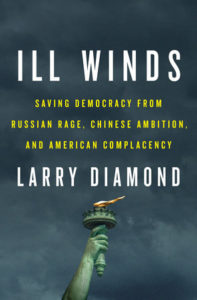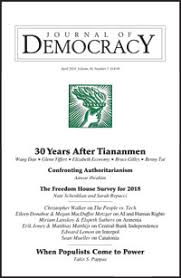 The United States stands at a precipice, facing a time when freedom and democracy will be tested. It remains, within the world’s vast web of alliances and organizations, the indispensable democracy, notes Larry Diamond, a Senior Fellow at Stanford University’s Hoover Institution and Freeman Spogli Institute for International Studies.
The United States stands at a precipice, facing a time when freedom and democracy will be tested. It remains, within the world’s vast web of alliances and organizations, the indispensable democracy, notes Larry Diamond, a Senior Fellow at Stanford University’s Hoover Institution and Freeman Spogli Institute for International Studies.
To add to the threat, the competition between democratic governments and authoritarian ones is not symmetrical, he writes for Foreign Affairs:
China and Russia are seeking to penetrate the institutions of vulnerable countries and compromise them, not through the legitimate use of “soft power” (transparent methods to persuade, attract, and inspire actors abroad) but through “sharp power,” a term introduced by Christopher Walker and Jessica Ludwig of the National Endowment for Democracy. Sharp power involves the use of information warfare and political penetration to limit free expression, distort the political environment, and erode the integrity of civic and political institutions in democratic societies. In the words of Malcolm Turnbull, the former prime minister of Australia, it is “covert, coercive, or corrupting.”
 Countering these malign authoritarian campaigns of disinformation, societal penetration, and ideological warfare will be critical for the defense of democracy, adds Diamond, drawing on his new book, Ill Winds: Saving Democracy from Russian Rage, Chinese Ambition, and American Complacency:
Countering these malign authoritarian campaigns of disinformation, societal penetration, and ideological warfare will be critical for the defense of democracy, adds Diamond, drawing on his new book, Ill Winds: Saving Democracy from Russian Rage, Chinese Ambition, and American Complacency:
What the United States needs now is not just a single program but an information agency staffed by a permanent, nimble, technologically innovative corps of information professionals—or, in the words of James Clapper, the former director of national intelligence, “a USIA on steroids.” The purpose of a revived USIA would not be to one-up China and Russia in the game of disinformation. …. The most effective way to counter Chinese and Russian propaganda is to report the truth about how the two gigantic countries are really governed. These facts and analyses must then be broadly and innovatively conveyed, within China, Russia, and other closed societies, and also within more open societies that, as targets of Chinese and Russian propaganda efforts, are no longer receiving a full and true picture of the nature of those regimes.
Russia and China are the real imperialists of the modern age. Their insider-run, exploitative economies have nothing to do with equality or justice, adds CEPA analyst Edward Lucas. Their political systems are based on securing the privileges of the ruling elites, not on accountability or contestability. If you dislike plutocracy, Moscow and Beijing should be the natural targets for your ire.
 At a forthcoming Carnegie forum, drawing from his new book, Ill Winds: Saving Democracy from Russian Rage, Chinese Ambition, and American Complacency, Diamond will analyze the daunting challenges facing democracy globally and how the United States can recover its role as a leader in international democracy support. Moderator Thomas Carothers will engage Diamond – the founding coeditor of the Journal of Democracy and the co-chair of the Research Council of the International Forum for Democratic Studies of the National Endowment for Democracy – in a structured discussion to probe his thinking and bring in the audience for a larger dialogue. Copies of Ill Winds will be available for purchase. RSVP
At a forthcoming Carnegie forum, drawing from his new book, Ill Winds: Saving Democracy from Russian Rage, Chinese Ambition, and American Complacency, Diamond will analyze the daunting challenges facing democracy globally and how the United States can recover its role as a leader in international democracy support. Moderator Thomas Carothers will engage Diamond – the founding coeditor of the Journal of Democracy and the co-chair of the Research Council of the International Forum for Democratic Studies of the National Endowment for Democracy – in a structured discussion to probe his thinking and bring in the audience for a larger dialogue. Copies of Ill Winds will be available for purchase. RSVP
| Thursday, June 13, 2019 |
| 12:15 to 1:45 p.m. |
| 1779 Massachusetts Avenue NW, Washington, DC 20036 |







